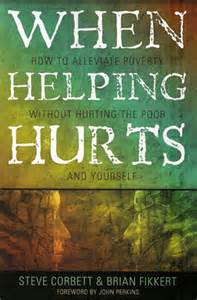Book Review: When Helping Hurts
Book Review: When Helping Hurts: How to Alleviate Poverty Without Hurting the Poor … and Yourself by Steve Corbett & Brian Fikkert
My husband, Kevin, has worked with nonprofits in Jackson since 2010. The first nonprofit he worked at had a strong mission to help alleviate poverty. From his experiences, we both grew to believe in the importance of breaking the cycle of poverty in our city.
Since then, we have had several students join our youth group that come from families that need assistance. Poverty isn’t just a word in my vocabulary; poverty has a name and a face.
One our my social worker friends told me that the entire staff was required to read and discuss When Helping Hurts at her job. So I decided to get myself a copy and read it, too.
It’s not meant as a mere good read but as a thought-provoking book to be used in a group setting. Each chapter begins with initial thoughts to answer, the chapter, and then reflection questions and exercises.
If anyone has this world’s goods and sees his brother in need but closes his eye to his need – how can God’s love reside in him?
–1 John 3:17
The preface involves the Biblical Mandate from 1 John 3:17 and says each one’s response is different:
- Poverty alleviation as a career
- Poverty alleviation as volunteers
- Hands-on, relational ministry
- Support frontline workers through financial donations, prayer, etc
- Work on government level to promote justice
- Work in business world to provide jobs
I’ll let the book speak for itself; here are two quotes that explain the premise of how to first confront poverty alleviation:
“When a sick person goes to the doctor, the doctor could make two crucial mistakes: (1) Treating symptoms instead of the underlying illness; (2) Misdiagnosing the underlying illness and prescribing the wrong medicine. Either one of these mistakes will result in the patient not getting better and possibly getting worse. The same is true when we work with poor people.” p. 54
“Poverty alleviation is the ministry of reconciliation: moving people closer to glorifying God by living in right relationship with God, with self, with others, and with the rest of creation.” p. 78
The one main takeaway that is crucial in order to understand this book is that you begin with assets, not needs (p. 126). In fact, they call it: ABCD= “asset-based community development” rather than need-based.
We so often look at these families and say, they need to quit this, start that, improve these things. The authors give personal examples of how this viewpoint of ministry harms both the giver and the receiver. Rather, we need to approach a situation asking, what are you really good at? What are your passions? Where do you talents lie? And then make a plan based on these aspects of their lives.
The book continues with many anecdotes and practical examples so I won’t repeat the text by placing it all here. But I will encourage you – no matter what your response to 1 John 3:17 is on the list – to pick up a copy of this book. Don’t be like me and read it alone. You’ll wish you had at least one other person to discuss it with. Get a book discussion group going and help alleviate poverty, not so that you will feel good about yourself but so that every one of God’s children will be living as He designed us to live – in a right relationship with Him, self, others, and the rest of creation.


No comments yet.
Add your comment